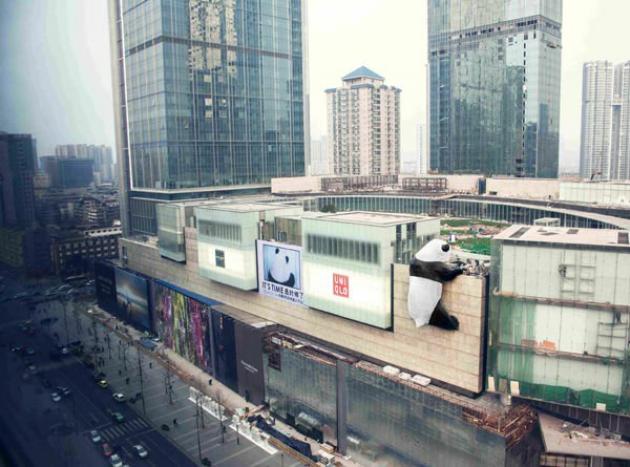A panda on the wall

Australian sculptor Lawrence Argent brings his playful art to China
LAWRENCE ARGENT is known for his giant public installations – a red rabbit leaping through an airport and a blue bear peeping into a convention centre.
In his first project in China, the Australian sculptor has installed a giant panda in a shopping mall.
The 15-metre-high artwork, “I Am Here”, hangs on the top floor of the newly opened Chengdu International Finance Square. Viewed from afar, the giant panda appears to be climbing the building.
“It [the panda] is an icon of China in many ways,” Argent says.
The animal is indeed a symbol of China, especially Chengdu, capital of Sichuan province.
Argent came up with the idea of the climbing panda in June, when a company asked him if he was interested in working on a panda art project in Chengdu.
“I wasn’t too sure about that in the beginning, because I do many different projects and they are not necessarily directed by a specific proposal like that. So that idea narrowed it down for me. And then I didn’t want to create an object, or a thing that was Disney-esque, because that’s easy for me,” the artist says.
However, when he reflected on the subject, he changed his mind.
“With this directive of the panda, I started to think of the panda I had to make and I started to think of the building – how does somebody experience it? This is a 750,000-square-metre place,” he says.
The artist says the panda has to interact with the building, so that the architecture, the sculpture and people become one.
“The project is not about that panda being in the building or an object outside the building. It’s about something that is integrated,” Argent says from the seventh floor of IFS. The giant panda’s nose is just a few metres away.
Shopper Jiang Shuchen’s experience proves Argent’s theory. Jiang was taking her child for a stroll nearby, and when the child saw the giant panda, he became excited, asking his mother to take him in to look at the panda’s face on the seventh floor.
Bringing the child inside, Jiang find herself spending the best part of 7,000 yuan (Bt37,000) as the journey upstairs takes them through several luxury boutiques.
“The art piece is interesting in a way. And it attracts people to come in and spend money,” Jiang says with a grin.
Chengdu IFS general operation manager Christina Hau says her team chose Argent because his installations are well integrated with public spaces.
“The panda is closely connected with the opening of IFS Chengdu. We posed a question to Lawrence: how do you make all things come together? Our building is gigantic, and we wanted something unique,” Hau says.
Argent says the installation must have a connection with human behaviour.
But how can Argent make the panda visible so that it is attractive and fulfils its purpose – encouraging consumers to enter the mall? He knew the seventh floor had a different aspect where he could make something that was partially hidden. “You want people to come in and get entertained through the building,” Argent explains.
People move through the space, and that is what the artist calls “the interaction between people and public projects”.
Argent says he also tries to convey a double meaning – he not only aims to provoke thoughts about our own existence through his work, he also wants people to reflect on the growing prosperity of the city.
The giant panda sculpture reminds people that we should not neglect the care of giant pandas amid rapid commercial development, the artist says.
Based in Denver, Colorado, Argent is a household name in the United States with his massive public art installations I See What You Mean and Leap.
“I See What You Mean” is a giant blue bear peeping into a convention centre in Denver.
“I wanted to create a relationship between us and nature, as well as the idea that people think of what art is. The consensus is that Colorado is not very progressive in art, so I wanted to play with the idea of that assumption,” Argent says.
“My work is all about what we think we know. Undermining that ‘what we know’ into a new possibility is my goal. How many times do we assume something and that assumption is incorrect? So the difficulty of my art pieces is about bringing that complexity to life,” Argent says.
“Leap” is a giant red rabbit in Sacramento Airport, California. According to Argent, the rabbit is not about the animal, but a vehicle for self-reflection. He explains the rabbit has a meaning for everyone, from childhood stories to live animals. When people go to an airport, they are full of energy and nervousness. The artist wanted to defuse their nervousness with this giant rabbit.
“And the rabbit is jumping into a suitcase, which represents a person. These are your items and possessions. This is a metaphor for the baggage you carry through your life, what happened to you to bring you to the point of who you are now.”
Art critic Feng Huang says public art becomes a success when it stimulates people in this public area to reflect and think.
“It is more than a decoration. It becomes meaningful when it appears only in this area,” Feng says.
The panda in Chengdu IFS is the first project that Argent has done in China. It is also one of the largest outdoor installations ever in Chengdu. Feng says it is a successful one.
“The panda becomes meaningful. The artist has made its bottom face the public – it is defiant toward the traditional image of a panda,” Feng says.
Argent says: “I’m not interested in creating an object of decoration. That’s not what I do. My task is to create something that fits the surrounding or the area. If it were to be removed, you would miss it.”





